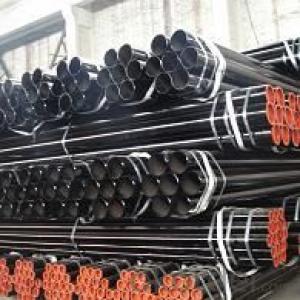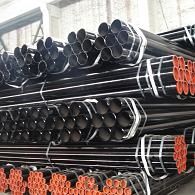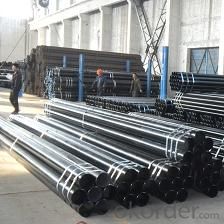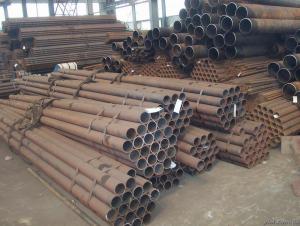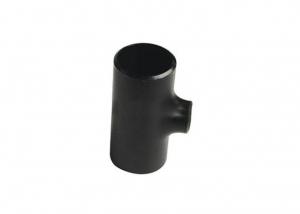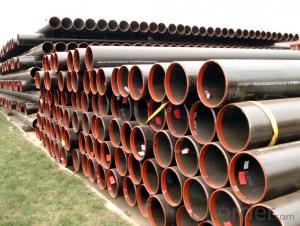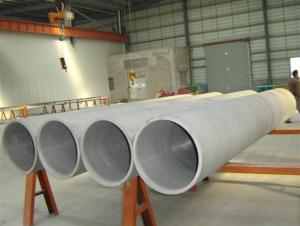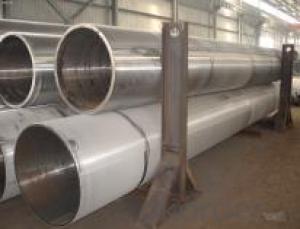CARBON SEAMLESS STEEL PIPE
- Loading Port:
- China Main Port
- Payment Terms:
- TT OR LC
- Min Order Qty:
- -
- Supply Capability:
- -
OKorder Service Pledge
OKorder Financial Service
You Might Also Like
Standard: API 5L, API 5CT, ASTM A106/A53, ASTM A519, JIS G 3441, JIS G3444, JIS G3445 DIN 2391, EN10305, EN10210, ASME SA106, SA192, SA210, SA213, SA335, DIN17175, ASTM A179…
Out Diameter: 1/8 – 30 inch (10.3-762mm)
Wall Thickness: 0.049” – 2.5” (1.24- 63.5mm)
Length: Random Length, Fixed Length, SRL, DRL
Steel Grade:
API 5L: GR B, X42, X46, X56, X60, X65, X70
ASTM A53/A106: GR A, GR B, GR C
ASME SA106: GR.A, GR.B, GR.C
ASME SA192: SA192
ASME SA209M: T1, T1a
ASME SA210: GR.A-1, GR.C
ASME SA213: T2, T5, T9, T11, T12, T22
ASME SA335: P2, P5, P9, P11, P12, P22, P91
DIN17175:ST35.8, ST45.8, 15Mo3, 13CrMo44
- Q: What is the average lifespan of a steel pipe?
- The average lifespan of a steel pipe can vary depending on various factors such as the quality of the steel, the environment it is exposed to, and the maintenance practices followed. However, on average, a well-maintained steel pipe can last anywhere between 20 to 100 years.
- Q: How are steel pipes used in the manufacturing of chemical processing equipment?
- Steel pipes are commonly used in the manufacturing of chemical processing equipment due to their durability, resistance to corrosion, and ability to handle high-pressure and high-temperature conditions. These pipes are used to transport various chemicals, gases, and liquids within the equipment, ensuring safe and efficient operations. They are also utilized for the distribution of heat transfer fluids, such as steam or hot water, to maintain optimal temperatures during chemical reactions.
- Q: How do steel pipes perform in extreme temperature variations?
- Steel pipes perform well in extreme temperature variations due to their high thermal conductivity and low thermal expansion coefficient. This allows them to efficiently transfer heat and withstand the expansion and contraction caused by temperature fluctuations without compromising their structural integrity.
- Q: What is the difference between hot dip galvanized steel pipe and galvanized steel pipe?
- 1, the process is different, one is chemical treatment, one is physical treatment; hot-dip galvanized coating is reliable, not easy to fall off2, hot-dip galvanized coating thickness, so strong corrosion resistance. And zinc plating (electroplating) coating evenly, surface quality is better, coating thickness is generally between a few microns to more than ten microns.3 hot galvanizing is a chemical process, which belongs to electrochemical reaction. Zinc plating is a physical treatment, just brush a layer of zinc on the surface, there is no galvanizing inside, so the zinc layer is easy to fall off. Hot-dip galvanizing is used in building construction.4 、 hot galvanized pipe is to make molten metal and iron matrix reaction and produce alloy layer, so that the substrate and coating two combination.
- Q: How do steel pipes compare to other types of piping materials?
- Steel pipes are widely considered to be one of the most durable and strong types of piping materials available. They offer superior strength, resistance to corrosion, and can withstand high pressure and extreme temperatures. Compared to other materials such as PVC or copper, steel pipes have a longer lifespan and are more suitable for heavy-duty applications. Additionally, steel pipes are highly recyclable, making them an environmentally friendly choice.
- Q: Can steel pipes be used for conveying sewage sludge?
- Indeed, sewage sludge can be conveyed using steel pipes. Steel pipes possess several properties that render them suitable for this purpose. Firstly, their strength and durability enable them to endure the pressure and weight of sewage sludge without collapsing or fracturing. This is of utmost importance as sewage sludge can be quite heavy and may contain solids that could exert stress on the pipes. Secondly, steel pipes exhibit resistance to corrosion, which is crucial when conveying sewage sludge that frequently contains corrosive components. By utilizing corrosion-resistant steel pipes, one can ensure a prolonged lifespan and minimize the risk of leaks or damage. Moreover, steel pipes can be manufactured in various sizes and diameters, granting flexibility in the design of sewage systems to meet specific requirements. Nonetheless, it is vital to emphasize the necessity of proper maintenance and regular cleaning to prevent sludge buildup and maintain the pipes' efficiency.
- Q: How long are the seamless tubes? Are they six meters long?
- The production process of seamless steel tube in general can be divided into two kinds of hot rolling and cold drawing, cold-rolled seamless steel pipe production process than hot-rolled seamless steel pipe seamless pipe hot rolling to complex, diameter is generally greater than 32mm, thickness 2.5-200mm, cold-rolled seamless steel pipe outside diameter 6mm, wall thickness to 0.25mm cold rolling hot rolling high precision ratio.
- Q: What are the different types of joints used to connect steel pipes?
- Some of the different types of joints used to connect steel pipes include butt joints, socket weld joints, threaded joints, flanged joints, and grooved joints.
- Q: How are steel pipes coated to prevent internal corrosion?
- Steel pipes are coated to prevent internal corrosion through a process called internal coating. This involves applying a layer of protective material, such as epoxy or polyethylene, to the inner surface of the pipe. The coating acts as a barrier, preventing the steel from coming into contact with corrosive substances in the fluid being transported, thus effectively reducing the risk of internal corrosion.
- Q: What are the different grades of steel used in pipe manufacturing?
- There are various grades of steel used in pipe manufacturing, including carbon steel, stainless steel, alloy steel, and high-strength low-alloy (HSLA) steel. Each grade has different characteristics and properties, making them suitable for specific applications and environments.
Send your message to us
CARBON SEAMLESS STEEL PIPE
- Loading Port:
- China Main Port
- Payment Terms:
- TT OR LC
- Min Order Qty:
- -
- Supply Capability:
- -
OKorder Service Pledge
OKorder Financial Service
Similar products
Hot products
Hot Searches
Related keywords
